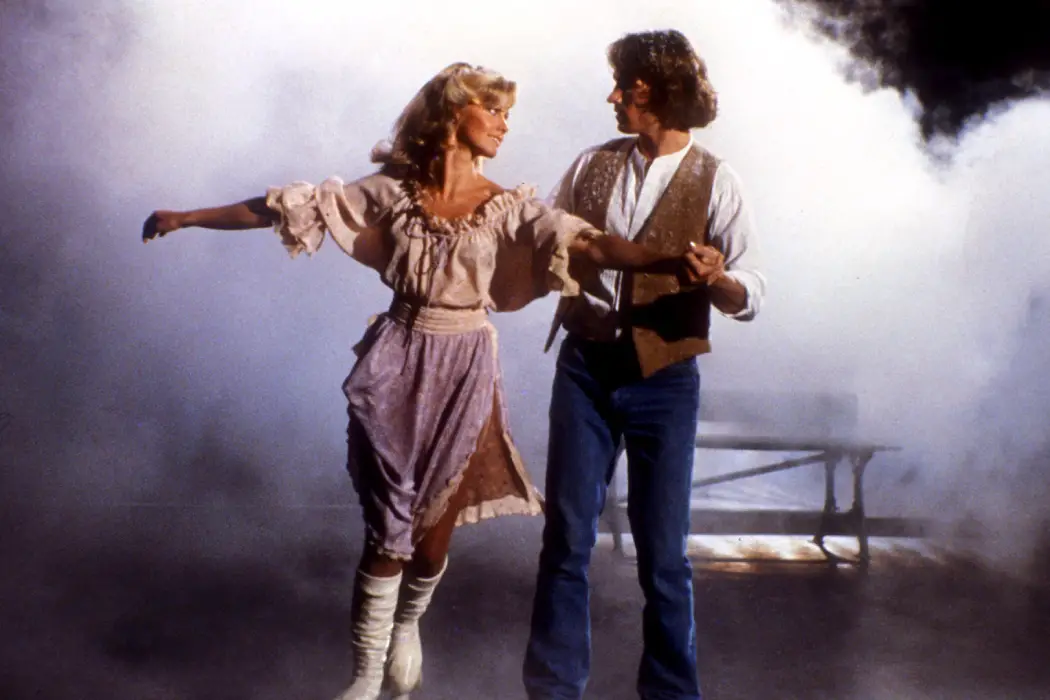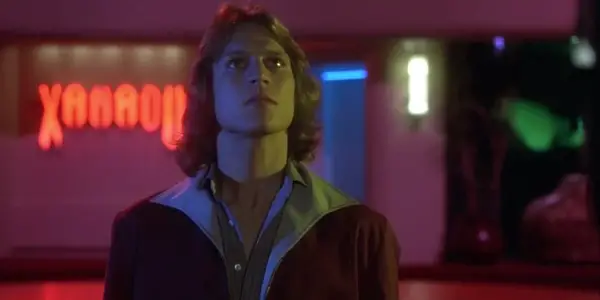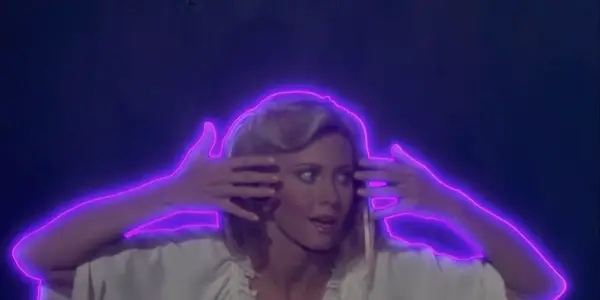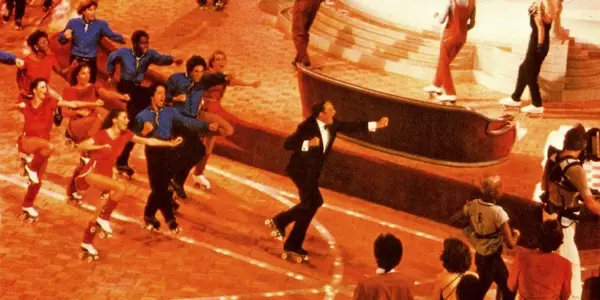My Campy Slumber Party: Xanadu, Muses, and Disco, Oh My!

Saffron is a Toronto-based culture writer pursuing a BA in…
My Campy Slumber Party is a column that celebrates nostalgic and underappreciated sleepover movies in all their unpretentious glory. Grab your comfiest clothes and greasiest snacks.
Like a number of nostalgic trends, roller skating has made a comeback during the quarantine. Slipping and sliding along the floors of cramped apartments, many are determined to master this eight-wheel art. In several ways, roller skates are the perfect remedy to lockdown boredom; they allow both frustrated millennials to pursue a tangible hobby that feels nearly productive and the TikTok youth to perfect their suburban skate routines to the tune of Jenny From the Block. But we can’t acknowledge this surge of interest in roller skating without addressing the pastime’s purest form: the roller disco.
While roller skating has been around for centuries (yes, really), roller disco emerged about fifty years ago as a space that combined skating with the rising public interest in disco music. The thrill of the roller disco is and likely always will be married to the late seventies when Travolta was king and roller rinks were frequented more than Mass. These rinks possessed a certain kind of magnetism that is instantly identifiable even to this day. The smell of urethane and greasy Friday night food, bell-bottoms grazing the sleek wooden floors, and the impossible charm of the central disco ball (née “mirror ball”) casting artificial starlight around the room.
While easily romanticized, it’s important to note that these spaces were never as free as they posited themselves to be. Because roller rinks were segregated into the sixties, Black Americans had to carve out an unrestrained skating scene of their own. (Tina Brown and Dyana Winkler’s documentary United Skates details this brilliantly.)

On-screen, roller disco can’t help but parody itself. Its film representations don’t run particularly deep and tend to provide saturated but uninspired looks into that world. The roller disco often acts as a sexually charged arena for defusing tension between two characters but, unfortunately, is rarely characterized outside of that. These gimmicks are on full display in Skatetown, U.S.A, and Roller Boogie and we get glimpses of them in Can’t Stop the Music, Playboy’s 1979 Roller Disco & Pyjama Party, and That 70s Show. But the standout example of this era—the roller disco film, if you will—has got to be Robert Greenwald’s Xanadu.
THE SKINNY
Loosely based on the 1947 film Down to Earth, Xanadu follows a struggling artist, Sonny Malone (Michael Beck), as he veers away from his passion and towards indifference. After an encounter with an enigmatic roller-skater, Kira (Olivia Newton-John), Sonny channels all of his energy into opening a roller disco-inspired nightclub with his eccentric new acquaintance, Danny (Gene Kelly, in his final acting role). We later discover that Kira is actually Terpsicore, the Greek goddess of dance, come alive from a nearby mural of the Nine Muses. And she was also Danny’s WWII-era love? If any or all of this seems confusing, I assure you, you’re not alone.
Even with elaborate musical numbers and Gene Kelly frolicking around a lavish penthouse, Xanadu is a slow-burn. This is unusual for a musical, especially one starkly influenced by seventies glamour. But the film is less about its segmented musical bits and more about the auditorium turned roller disco nightclub: Xanadu. The term Xanadu derives its meaning from the mythic silkiness of Samuel Taylor Coleridge’s poem “Kubla Khan”, where Coleridge conjures up an idyllic and lush landscape fit for a king. Here, Greenwald uses the term to render the roller disco divine; a haven for the clickety-clack of skates meeting the floor and a physical manifestation of victory for the lowly artist.

With all its warm whimsy, extravagance, and touches of Don Bluth’s early animation, one would assume that Xanadu was regarded fondly by audiences. (But surely, I wouldn’t be writing about it if that were the case.) While it performed adequately at the box office, critics quickly deemed the film a Xana-don’t, so much so that it actually inspired the creation of the Golden Raspberry Awards (or “Razzies”) in 1981. Currently holding a 27% on Rotten Tomatoes and a two-star rating from the late and great Roger Ebert, Xanadu’s legacy is not a favourable one.
THE DAY I MET THE MUSES
Now, I first encountered Xanadu in February of this year (you know, pre-hell). In proper slumber party fashion, my friend and I watched it the night after my twentieth birthday. Sandwiched between When Harry Met Sally and The Matrix, Xanadu was something of an odd choice. But we were hungover and riding a Nora Ephron high so a roller disco musical felt apt. Early on, however, the film fell flat for both of us: did Olivia Newton-John just dance her way out of the wall? Why is she glowing neon purple? Is that GENE KELLY? They still haven’t finished setting up the discotheque?
Xanadu’s cardinal sin isn’t its cheesiness or perplexing plot, but its failed potential. With a $20 million dollar budget, Greenwald could have done so much more with this subject matter, like emphasizing the unifying potential of disco or delving into the film’s mythological subtext. Instead, Xanadu often feels like someone lazily recounting a fever dream, with Newton-John aimlessly weaving in and out when needed. In this respect, Kira epitomizes the Manic Pixie Dream Girl. Despite being central to the plot, her presence only serves to further the film’s male leads; she’s Sonny’s inspiration, Danny’s nostalgia, and Zeus’ doting daughter, all at once. But what’s more problematic than Xanadu’s gendered implications is that it’s a roller disco film that fails to accurately capture RDE (Roller Disco Energy).

Like most bad movies, Xanadu ended up growing on me; enough so that it’s cemented as part of my slumber party watchlist. The film may not succeed at depicting roller disco in all its glory, but it still manages to capture the hazy romanticism of that era. The prospect of love at first glance, the capitalistic fulfillment of a bygone American Dream, and a bubbly ending. Despite its noticeable shortcomings, I think there’s a larger reason for Xanadu’s poor reception. One that stretches beyond boredom and impermanence: the death of disco.
DISCO FINITO
The dwindling public interest in disco music reached its peak at Comiskey Park in July 1979, where disco arguably “died.” Disco Demolition Night, a reckoning for rock fans, was an anti-disco event that ended in a riot. It was simple—the price of admission was 98 cents, a disco record, and the assurance that it would soon after be destroyed. After countless chants of “DISCO SUCKS” and records flung into a fiery pit, Comiskey Park quickly went from a homey baseball stadium to a hateful chorus of 50,000. (I can only assume that the Gibb brothers had descended into a safe room by this point.) Forty-one years later and this night is still a contentious topic, regardless of how one might feel about disco music.
I’m not trying to suggest that Xanadu’s faults are absolved by its poorly timed release, however, I’d be remiss to ignore the cultural climate of the late 1970s when discussing it. Xanadu’s soundtrack was still received warmly, but the film’s rampant optimism and fidelity to disco-era aesthetics are likely what left a bitter taste in audiences’ mouths. It’s possible that the film could have found its footing in the height of disco fever, but it’s very unlikely that it would have dodged criticism altogether.
Critics’ complaints that Xanadu was bland, uninspired, and outright confusing are valid concerns, however, there is no denying how much heart this film has. It was never designed to age well and oddly, because of that fact, it remains relevant to this day. It’s this impermanence that makes Xanadu feel significant; a then-product now-relic of the 1970s that celebrates the disco-era long after its demise. For better or for worse.
What are your thoughts on Xanadu? Let us know in the comments!
Watch Xanadu
Does content like this matter to you?
Become a Member and support film journalism. Unlock access to all of Film Inquiry`s great articles. Join a community of like-minded readers who are passionate about cinema - get access to our private members Network, give back to independent filmmakers, and more.
Saffron is a Toronto-based culture writer pursuing a BA in Cinema Studies and English at the University of Toronto. Her work has been featured at Little White Lies, MUBI Notebook, and Girls on Tops, among other corners of the internet.













